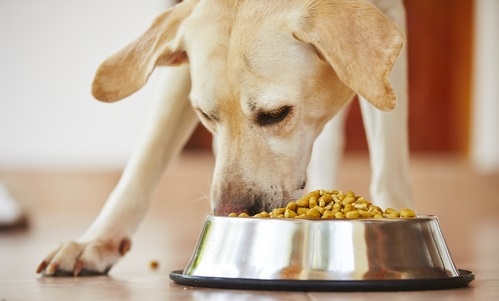No doubt you have seen it in your local pet store, the great wall of dog food with every imaginable brand, style, and size laid out on display. With so many brands and varieties to choose from, it can be hard to know exactly what kind of food to buy for your furry companion. The best thing to do is to pick a brand you trust, whose ingredients you can pronounce, and use that as a starting point to identify the best food for your dog.
Adult Dog Food vs. Puppy Food: A Food for Every Age
Age is one of the most common ways brands differentiate their products within their own variety of options. Typically the three classifications you will see are “puppy,” “adult dog,” and “senior.” Puppy formula is designed for dogs up to two years of age while adult dog food is typically for dogs ages two through six. When it comes to senior dog food, this variety is usually for dogs seven years and older. Each classification of food plays a particular role in the health of your dog, especially in regards to what nutrients their bodies need at certain stages of life. While the differences between a senior diet and regular adult dog food aren’t significant, the differences between adult dog food and puppy food are substantial.
Nutrients for growth
 Puppy food is full of additional nutrients that are important for development and growth for your little pup. You may be asking, if puppy food has more nutrients, then shouldn’t I be giving it to my full grown older dog? Not exactly. While this information may lead you to believe that added nutrients are beneficial for all dogs, the additional ingredients in puppy food are proteins and enzymes that puppies need specifically to help their bodies grow and develop. Older dogs do not need these additional proteins as the body chemistry of a dog changes radically after the first two years of life.
Puppy food is full of additional nutrients that are important for development and growth for your little pup. You may be asking, if puppy food has more nutrients, then shouldn’t I be giving it to my full grown older dog? Not exactly. While this information may lead you to believe that added nutrients are beneficial for all dogs, the additional ingredients in puppy food are proteins and enzymes that puppies need specifically to help their bodies grow and develop. Older dogs do not need these additional proteins as the body chemistry of a dog changes radically after the first two years of life.
Higher Caloric Content
One of the significant distinctions between puppy food and regular dog food is calorie content. Calories are essential for any dog, but they are especially important for puppies. Because puppies are growing and changing at a rapid pace, they are burning more calories than the average dog. As a result, puppies need more daily calories per pound than a full grown pup. Additionally, puppies require more calories because they are not able to retain body heat as well as a full grown dog. A higher calorie diet allows a puppy to create the body heat he needs internally to survive.
Proteins for bones and muscles
The biological changes happening to a puppy within the first two years require specific nutrient-rich proteins. These proteins are called amino acids, and they are the foundation of healthy bones and strong muscle tissue. Amino acids are put into puppy food to assist with bone and muscle development. If a full grown dog were to eat a diet high in amino acids, it could lead to higher cholesterol, heart issues, joint problems, and other serious health risks.
Is All Puppy Food The Same?
If you recall from earlier, there are many classifications of dog food, and each has their specific use. For puppies, the size of the breed plays a significant role in determining what kind of nutrients and proteins are needed to promote the right type of growth. For example, a Great Dane has different feeding needs compared to a Chihuahua. To provide a quick example, smaller dogs will not require as many proteins as a larger dog but will need more calories per pound due to their surface to volume ratio. Similarly, a larger dog will not need as many calories but will need more proteins and fatty amino acids to assist with rapid bone growth and muscle development. Even within the classification of “puppy food,” the subclassification of weight and breed is an important distinction that will ensure your puppy is getting the specific nutrients he needs.
When Do I make the switch from Puppy Food to Adult Food?
 Puppies can take anywhere from 1 to 2 years to reach adulthood. Growth and development are breed specific, so it is crucial to maintain ongoing consultations with your vet about how your puppy is progressing in the maturation process. Once your puppy reaches about 80% of his growth potential, it should be fine to switch to a food formula designed for adult dogs. For most breeds, this switch happens somewhere around the 1-year mark, but larger breeds take slightly longer to mature whereas smaller breeds grow quicker.
Puppies can take anywhere from 1 to 2 years to reach adulthood. Growth and development are breed specific, so it is crucial to maintain ongoing consultations with your vet about how your puppy is progressing in the maturation process. Once your puppy reaches about 80% of his growth potential, it should be fine to switch to a food formula designed for adult dogs. For most breeds, this switch happens somewhere around the 1-year mark, but larger breeds take slightly longer to mature whereas smaller breeds grow quicker.
A healthy diet is the key to a healthy life for your dog. It is important to feed your dog high-quality food with the right nutrients based on his age, weight, and breed. When determining what kind of food to give to your dog, it is best to consult your vet to gain insight into any additional canine dietary needs or restrictions your dog may have. That dog food aisle may be daunting, but somewhere amidst all those options, there is a food that is just right for your dog.
Sources:
- “What Is The Difference Between Adult Dog Food And Puppy Food?” Dog Food Insider, 10 Jan. 2017, www.dogfoodinsider.com/difference-adult-dog-food-puppy-food/.
- “What’s the Difference Between Adult Dog Food and Puppy Food?” PetMD, www.petmd.com/blogs/nutritionnuggets/dr-coates/2016/january/whats-difference-between-adult-dog-food-and-puppy-food.
- Lachlei, M.B. “Is There Really a Difference in Puppy Foods?” Pets, 21 Nov. 2017, www.pets.thenest.com/there-really-difference-puppy-foods-9869.html.




